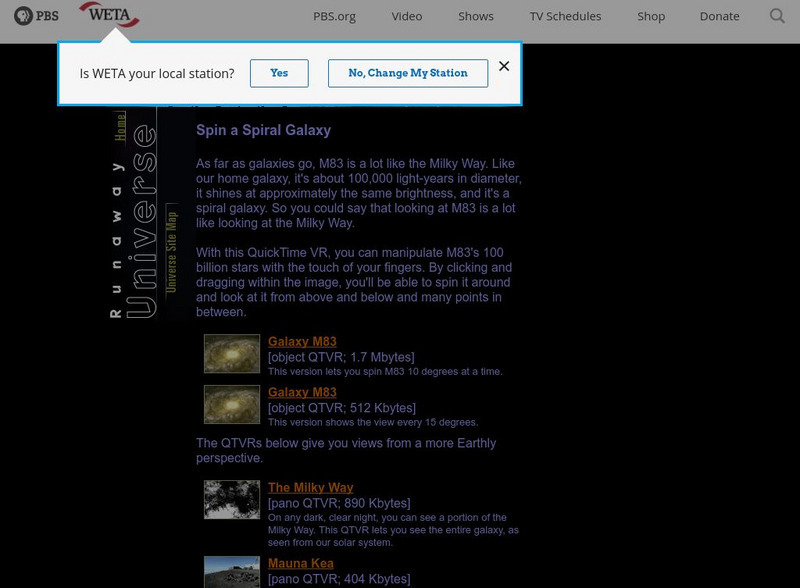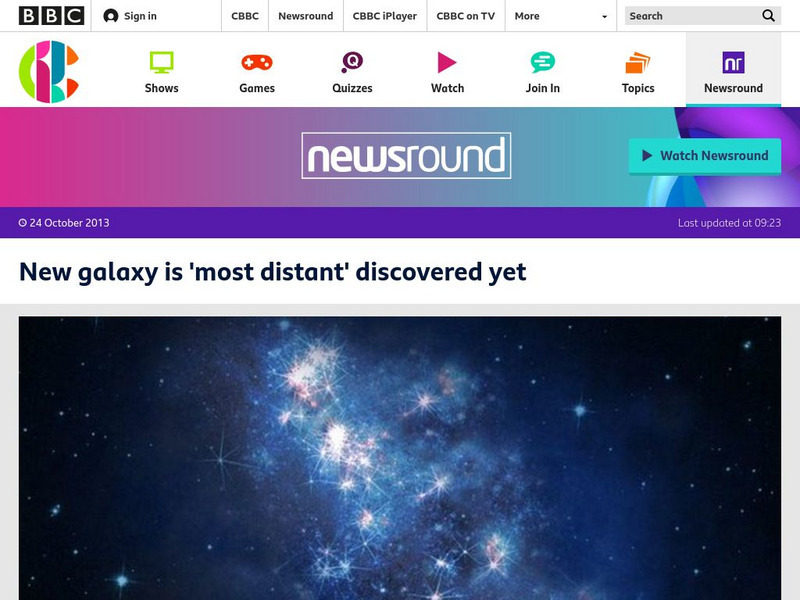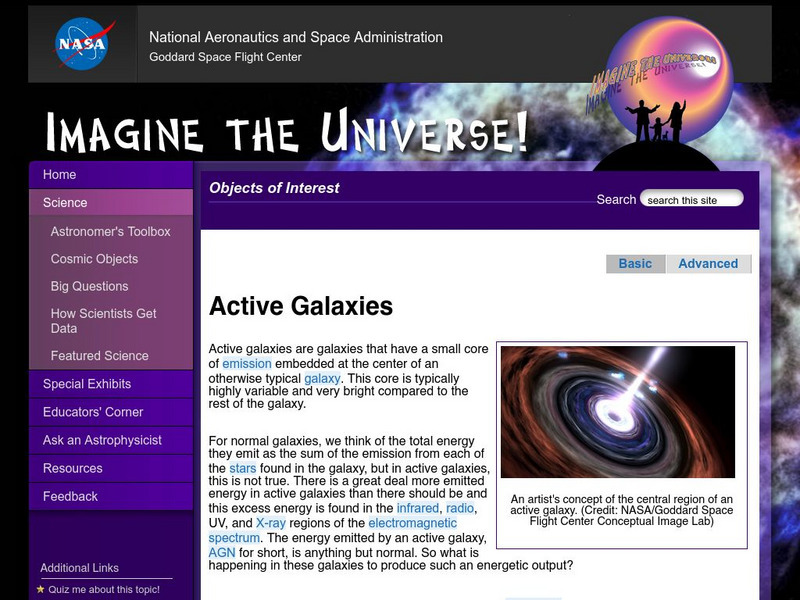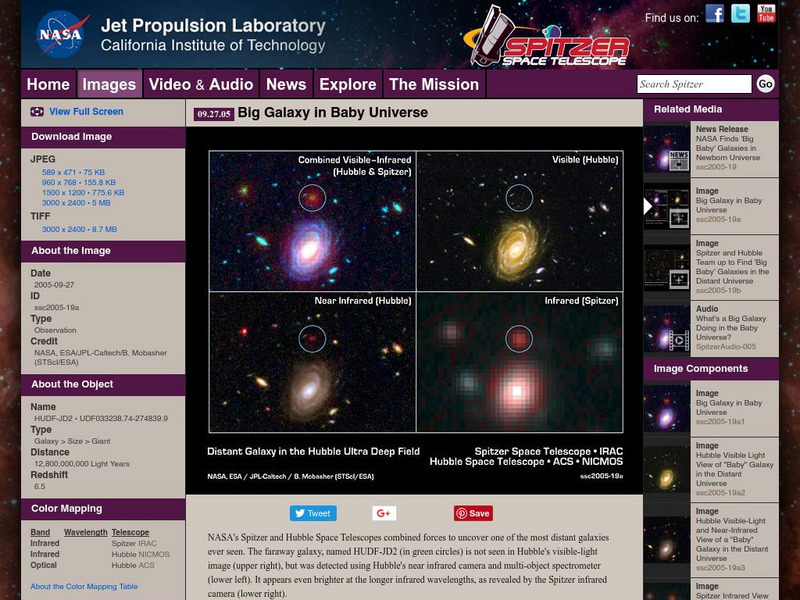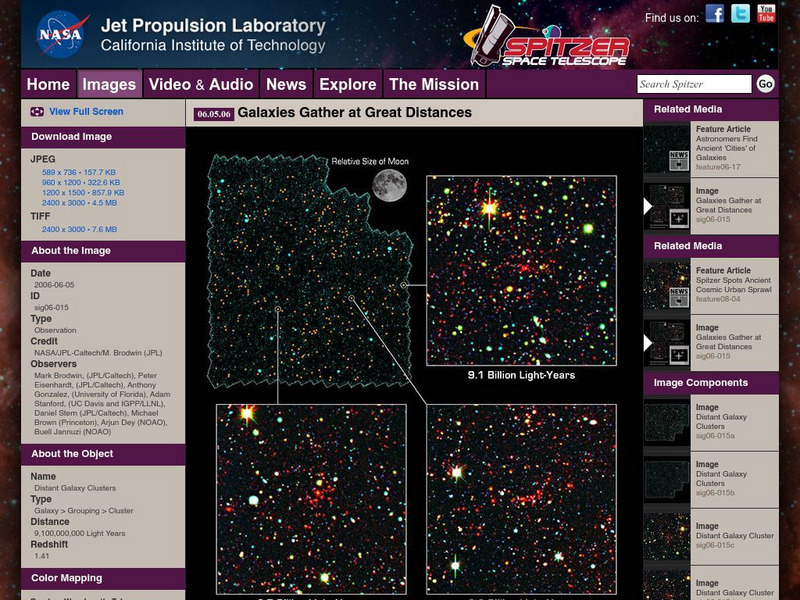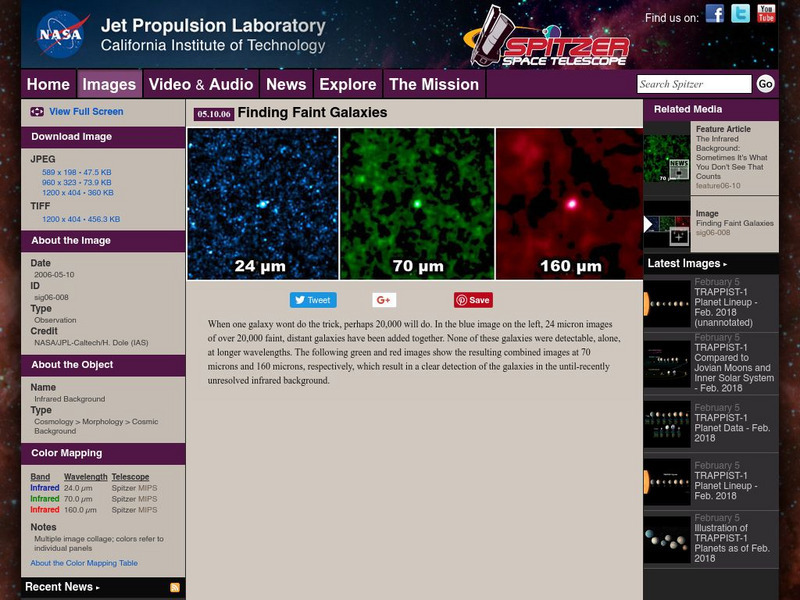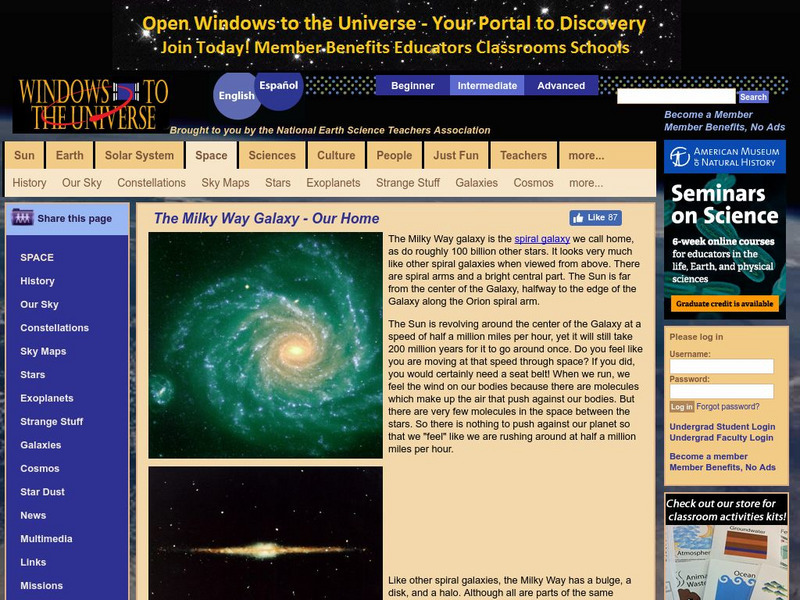PBS
Pbs Nova Online: Spin a Spiral Galaxy
PBS site provides various views of spiral galaxies. (Quick Time required) With this technology, you can manipulate the image to spin it around and look at it from various angles.
BBC
Bbc Newsround: New Galaxy Is 'Most Distant' Discovered Yet
Article reports on the discovery by the Hubble telescope of the most distant galaxy known at this point.
Cosmos 4 kids
Cosmos4 Kids: Galaxy Cluster Basics
Understand what galaxy clusters are on this site which contains both information and a video.
Space Telescope Science Institute
Amazing Space: Galaxy Hunter
Journey to the wildest regions of space, and wrestle with cosmic giants, galaxies. Explore the Hubble Deep Fields from a statistical point of view.
Other
University of Leicester: Irregular Galaxies
Provides a general overview of irregular galaxies, including a specific look at type I and type II irregulars.
Other
University of Leicester: Spiral Galaxies
Provides a general overview of spiral galaxies, including descriptions of the different classes of spiral galaxy.
Other
Sloan Digital Sky Survey: Galaxy Zoo
Explore the universe like you have never seen it. Take part in classifying images of galaxies taken from the Hubble telescope archives. This is a crowdsourced scientific research project.
NASA
Nasa: Imagine the Universe: Active Galaxies and Quasars
Describes quasars as being classified within the category of an active galaxy. A description of the emergence of high-energy. Definitions of key words are provided.gamma-ray quasars as an important component of the gamma-ray sky.
Thinkport Education
Thinkport: Translating Qualitative & Quantitative Details a New Galaxy
In this science-themed literacy lesson, students learn how to read for and differentiate between qualitative and quantitative information.
Other
Physics.org: A Grain of Sand Covers 10,000 Galaxies
A fascinating look at how big our solar system really is. Shows how we can only see a tiny bit of our vast universe.
TED Talks
Ted: Ted Ed: Could Human Civilization Spread Across the Whole Galaxy?
Could human civilization eventually spread across the whole Milky Way galaxy? Could we move beyond our small, blue planet to establish colonies in the multitude of star systems out there? These questions are pretty daunting, but their...
California Institute of Technology
Cool Cosmos: Ask an Astronomer
Cool Cosmos and NASA help explore the world of galaxies! This site provides the answers to kid's most frequently asked questions.
Other
Sky Server: Galaxies
SkyServer explains and presents images of spiral galaxies, elliptical galaxies, irregular galaxies, galaxy clusters, galaxy collisions and the like.
California Institute of Technology
Spitzer Space Telescope: Dissection of a Galaxy
The Dissection of a Galaxy image offered here examines how a galaxy functions by taking it apart through an image. In addition, a detailed textual overview explains various specifics of the picture.
California Institute of Technology
Spitzer Space Telescope: Our Galaxy's 'Twin'
This image, titled "Morphology of Our Galaxy's 'Twin'" features three individual pictures of a nearby spiral galaxy that closely resembles our own. The text under the image details various specifics about the picture.
California Institute of Technology
Spitzer Space Telescope: Big Galaxy in Baby Universe
This image, titled "Big Galaxy in Baby Universe" features an infrared picture in four parts of a distant galaxy. The text under the image details various specifics about the picture.
California Institute of Technology
Spitzer Space Telescope: Galaxies Gather
Under the heading, "Galaxies Gather at Great Distances" this site examines (and discusses) an image featuring a group and cluster of galaxies. The text goes on to describe details specific to the image.
California Institute of Technology
Spitzer Space Telescope: Finding Faint Galaxies
The brief text that accompanies the image at this site (titled Finding Faint Galaxies) describes details of the picture which features faint images of galaxies enhanced by infrared.
Mocomi & Anibrain Digital Technologies
Mocomi: What Is a Galaxy?
Explains what galaxies are and their different shapes. Includes details on the Milky Way.
California Institute of Technology
Nasa: Great Observatories Present Rainbow of a Galaxy
The Great Observatories Present Rainbow of a Galaxy image is part of a series of photographs taken from the Spitzer Space Telescope. The picture is accompanied by a brief textual overview outlining specific details in the picture.
Ducksters
Ducksters: Astronomy for Kids: Galaxies
Kid's learn about the science of Galaxies. Large groups of stars such as the Milky Way throughout the universe are an interesting part of astronomy.
Other
University of Leicester: Elliptical Galaxies
Provides a general overview of elliptical galaxies, including a look at what defines an elliptical galaxy, what determines its shape, and it's physical nature.
National Earth Science Teachers Association
Windows to the Universe the Milky Way Galaxy
Learn what Milky Way galaxy is made of and what it looks like, as well as how it relates to other known galaxies. Read "Questions and answers about the Milky Way" for further information.
American Museum of Natural History
American Museum of Natural History: Ology: Milky Way Galaxy
How big is a billion? Find out some interesting facts about our galaxy, the Milky Way, and its billion stars.
Other popular searches
- Galaxies 5 E's
- Stars and Galaxies
- Types of Galaxies
- Milky Way Galaxies
- Universe Stars Galaxies
- Universe and Galaxies
- Classifying Galaxies
- Galaxy Galaxies
- Active Galaxies
- Galaxies and Space
- Solar System Galaxies
- Spiral Galaxies


